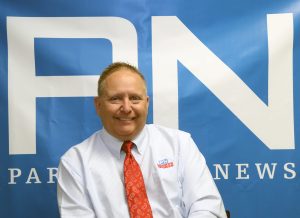Racial segregation during WWII
February is Black History Month. In recognition, I’d like to share a story I came across in our archives that speaks to racial segregation during the World War II era.
Segregation was still commonplace in the years following World War II, but attitude changes were slowly occurring as many people dug in their heels in opposition.
One example was the action taken by a new veterans service organization called the Paralyzed Veterans Association of America, which was later shortened to Paralyzed Veterans of America (PVA).
Leaders of this new group refused to accept a situation they found themselves facing under what were commonly referred to as Jim Crow Laws. On Sept. 26, 1947, PVA had called to order its second formal meeting, a three-day conference taking place at the Hunter Holmes McGuire Veterans Administration Hospital in Richmond, Va., with a closing banquet planned at the Hotel John Marshall on Sept. 28.
However, the hotel informed PVA that none of its Black members or delegates would be allowed to attend the banquet. PVA members voted for a telegram of protest to be sent to the hotel and to notify the press of the situation.
The local Richmond Times-Dispatch newspaper began its coverage on Sept. 27 with an article on page 3, titled Racial Ban Lifting Asked For Meeting. The article detailed the circumstances and included the following excerpt from the telegram:
“The telegram, signed by Gilford Moss, of Chicago, national chairman for the Paralyzed Veterans’ Association stated that, ‘We have been informed that the Negro members of the Paralyzed Veterans Association will not be allowed to join us at our banquet that concludes our convention.
The Paralyzed Veterans Association of America urges the manager of the hotel to reconsider his stand for this occasion. As an organization we are not concerned with the problems of racial prejudice but we do know that a spinal-cord injury knows no bias.’ ”
Years later during a 1985 interview for the PVA-published book An Oral History Of The Paralyzed Veterans of America, Robert Moss, who was PVA’s second national president, recalled notifying the press, “I called in the wording to the wire services, DPI and Associated Press.
I forget the exact wording now, but something to the effect that spinal cord knows no bias. When I called it in and the operator heard the language, she said in a very thick Southern drawl, ‘It’s about time people around here got some sense.’ ”
The day after its original story, the Richmond Times-Dispatch ran a follow-up article titled Hotel Lifts Racial Ban For Banquet. Detailing the latest news of the situation, the article read, “Hotel John Marshall, which had refused to permit paralyzed Negro Veterans to attend a banquet there tomorrow night, yesterday rescinded its action. The annual banquet is scheduled for 7:30 p.m. in the Virginia Room of the Hotel.”
It was the first time that Blacks had been served in the Hotel John Marshall since the Civil War. This occurred just 10 months before then-U.S. President Harry Truman signed Executive Order 9981, Desegregation of the Armed Forces, which stated that “there shall be equality of treatment and opportunity for all persons in the armed forces without regard to race, color, religion, or national origin.”
This order also established the President’s Committee on Equality of Treatment and Opportunity in the Armed Services, an advisory committee to examine the rules, practices and procedures of the armed services and recommend ways to make desegregation a reality.
I was glad to see that PVA took a position, however controversial at the time, that we can now look back on and say, “We were on the right side of that one.” Gilford Moss and that convention of delegates showed their recognition of bonds that occur between so many PVA members because “a spinal-cord injury knows no bias.”
The Hotel John Marshall was converted into an apartment complex in 2011, but the Virginia Room where PVA’s banquet took place lives on as part of the John Marshall Ballrooms and is now a popular choice for wedding receptions.



